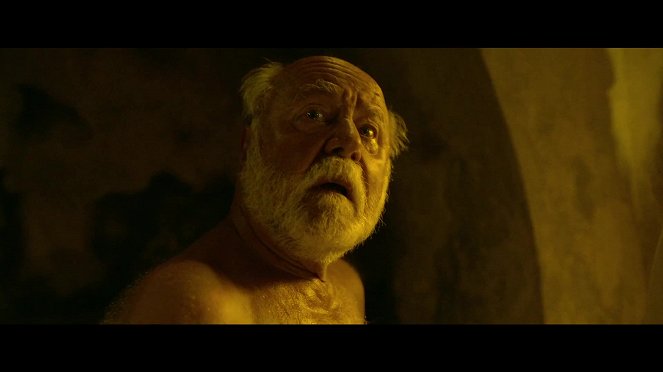Réalisation:
Kornél MundruczóPhotographie:
Marcell RévMusique:
Jed KurzelActeurs·trices:
Merab Ninidze, Zsombor Jéger, György Cserhalmi, Móni Balsai, Sándor Terhes, Zsolt Nagy, Majd Asmi, Zsombor Barna, Szabolcs Bede Fazekas (plus)Résumés(1)
A young refugee called Aryan is shot while illegally trying to cross the Hungarian border to escape his war-torn home. While tending him back to health, a doctor at a refugee camp discovers that Aryan has gained an extraordinary talent – he can levitate at will. But the doctor has his own predicament that he needs to escape from and offers to smuggle Aryan out of the camp if, in return, he helps him make some money by using his new miraculous gift. (Curzon Artificial Eye)
(plus)Critiques (5)
Un genre d’Inception à la sauce hongroise avec un médecin qui a mauvaise conscience, un flic malveillant antiréfugiés et un jeune réfugié syrien qui est immortel et peut voler. Non, ça n’a rien d’une œuvre d’art et c’est aussi con que ma description le laisse supposer. Et on y trouve une course-poursuite musclée filmée en une seule prise dans l’air matinal des rues de Budapest. Un film de genre bancal dont l’ambition formelle contraste avec un contenu non fonctionnel émotionnellement et sémantiquement. Ainsi, l’ensemble n’a de quoi convaincre ni les ados avides d’action et d’effets spéciaux ni les philosophes amateurs de thèmes existentiels. Ça vise les festivals et Hollywood, mais d’après moi, sa place reste dans la tente avec les hot-dogs.
()
Jupiter’s Moon is a major surprise, primarily because a person from Eastern Europe definitely would not expect a film of such rank. The film is not a committed festival darling as the premise may suggest, but rather has the most in common with the ambitious Hollywood overground. It unavoidably brings to mind Children of Men, with which its Hungarian equivalent shares not only plot motifs, but also a formal sweep and breathtaking production. With the aid of brilliantly conceived long shots with complicated camera movements and epic mise-en-scène, Mundruczó, like Cuarón, creates a pulsating image of the world, which serves as an attractive realistic framework for the fantastic plot. Both films tell variations of archetypal stories, but while the American project helps the archetype gain new emotionality and urgency, the Hungarian film brings a degree of morality with social and religious levels to the formula of a “Hollywood” story of awakening and salvation. Another analogy is Luc Besson’s work in the 1990s, which Jupiter’s Moon evokes primarily with its colour palette and overall style. However, whereas Besson placed genre-specific characters in outlandish non-genre-specific environments and situations, Mundruczó puts flawed, doubtful and egocentric non-genre-specific protagonists into larger-than-life genre-specific situations. Concurrently, when considering the context of the Hungarian reality with real refugees at the border and a polarised society, it is not easy to determine where Jupiter’s Moon falls on the scale of commercial art. However, it unambiguously provides overwhelming proof of the vitality of Hungarian cinema. If in previous years Czech criticism used it as a contrast for taking the measure of Czech production, it is now proving to be something completely unattainable for both local filmmakers and institutions. Jupiter’s Moon is an engaging spectacle that addresses the themes of its own festival-film production. With its sweeping nature, it also liberates the reality of refugees from the usual understanding offered by the media and brings forth a devastating catharsis of its incomprehensible monstrousness.
()
D'un point de vue technique, La Lune de Jupiter est une victoire absolue, parfaitement réalisée, avec une caméra et une stylisation artistique parfaites, combinant des thrillers américains des années soixante-dix et des films de science-fiction modernes tels que Chronicle, Les fils de l'homme ou Inception, mais il s'agit tout de même d'un film hongrois. Un excellent début avec une descente parmi les migrants illégaux, plusieurs scènes d'action/évasion brillantes et un sujet remarquable ne parviennent pas à dissimuler les lacunes de l'histoire, qui tourne en rond et manque de rebondissements réfléchis, et qui mélange de manière quelque peu inutile des analogies religieuses à son commentaire social sur la crise des réfugiés. Malgré cela, c'est encore un exemple de l'essor incroyable du cinéma hongrois ces dernières années.
()
It's fascinating how many people can't find an excellent story unless a film explicitly tells them that it's telling one. In Jupiter's Moon there are dozens of suggestions and ideas in virtually every one of its long, incredibly composed takes. Yet nothing in it begs for your sympathy, the characters are confused, jaded, corrupt, and selfish, the refugee issue is not viewed in a purely one-sided way (we even get a terrorist attack), and it doesn't give answers. Only a vision of a torn, sodden continent, devoid of miracles, whose weakness has been exposed by the influx of convinced, head-high refugees fleeing destruction. I would have expected something this wild and radical from a 25-year-old director. Last year with Poland's The Last Family, this year with Hungary's Jupiter’s Moon, the Czech Republic really should hand in its filmmaking pass for the next ten years.
()
I must say I got a little lost in this film. I didn’t find the main character relatable. Plus, I didn't get what the filmmakers were trying to tell me. The three stars are for the sometimes almost stunning visuals, but the writing left a lot to be desired as far as I’m concerned. Also, I'm still wondering how the rotation of the apartment was supposed to work...
()

